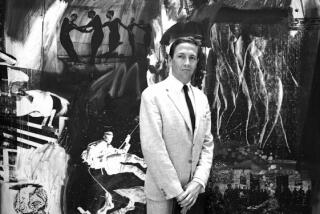TV Reviews : What ‘Abbado in Berlin’ Does and Doesn’t Tell
“Abbado in Berlin: The First Year” tells a great story. But it is a deeply revisionist story in what it does not tell. (It airs tonight at 8 on KVCR Channel 24 and at 9 on KPBS Channel 15, and on Sunday at 4 p.m. on KCET Channel 28.)
In some ways, that may have been inevitable. Like many of the PBS “Great Performances” shows, this is a CAMI Video, produced in familiar style by Peter Gelb and Susan Froemke. And those shows, of course, are basically soft promotional vehicles for Columbia Artist Management Inc. clients.
The program begins with the death of Herbert von Karajan and moves quickly to the nomination of Claudio Abbado to succeed him, pictured here as a quick and untroubled ascension. Forget the intense and often bitter politicking that went on. Forget other candidates and, most of all, forget how much CAMI was involved in the machinations.
Gelb brings on one of the Berlin musicians to describe the estrangement of Karajan and the orchestra in latter years. Forget that Gelb himself was at the center of the final scandal, which broke over a dislocated tour to the Far East.
The musicians depict themselves as freedom fighters, battling the overweening pride of their conductors. Forget that it was these selfsame democrats who appointed Karajan their leader for life, and that one of the tyrannies to which they objected was the inclusion of a woman in their ranks.
Forget . . . well, history. Revel instead in the gentle personality of Abbado, and in the euphoria of the reunion of the Berlins. That sociological context is developed through segments featuring pianist Siiri Schutz, an East German teen-ager who is able to audition for Abbado after the fall of the Wall.
Better yet, tune in for a performance of Mahler’s First Symphony, taped at Abbado’s first concert as music director of the Berlin Philharmonic. The weird prominence given some subsidiary parts suggests post-production tinkering rather than concert effects, but this is a deeply felt, absorbing account, delivered with blazing virtuosity.
More to Read
The complete guide to home viewing
Get Screen Gab for everything about the TV shows and streaming movies everyone’s talking about.
You may occasionally receive promotional content from the Los Angeles Times.






